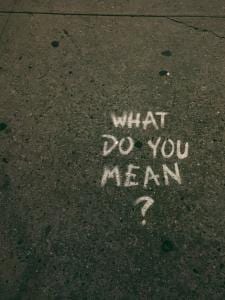
Recently, while studying for a class in my doctorate program, I came across a quote that has stayed with me over this last week. “There is a reasonable hypothesis that spirituality or an awareness of a sense of connectedness to all others will lead to generative performance” (Perera-Diltz, Dilani, et al. 494). I guess that first we should define “generative”. It is the idea of reproducing something, in this case, that which we pass on to the next generation. This can include our ideas, our education and scientific findings, or it could pertain to our belief structures. For many, their beliefs evolve as they grow older. They may become deeper or more thought out. They may provide better understanding of self and others, or they may change entirely. Regardless of how they function, they are a product of our experiences, familial history, and environmental surroundings. We learn from them and pass them along to our children. So why has this stuck with me?
I am reminded of some of the beliefs that I held from my childhood. Beliefs regarding God and where I fit into the grand scheme of everything. My religious background (Christianity) holds some beliefs that I have come to question in my adulthood and most specifically in my middle adulthood (that magical time between 40 and 60 years of age. Yes, I am kidding about magical). Most would associate this time with some type of mid-life crisis and maybe that is what this is, yet it feels more significant. In the study of lifespan, religiousness was more correlated with altruism and selfless giving, which is viewed as communally oriented, while spirituality was correlated with impact on others and the legacy the we leave personally (Perera-Diltz, Dilani, et al. 493). So, let me give you an example of this difference from my belief system.

When I was a child, I was taught to believe that God at some point would return and rapture those who had professed an allegiance or belief in Jesus, and that those left behind would suffer through some pretty horrible things before finally dying and facing judgment. It is all very dramatic and pretty consuming for a young child. I literally watched the news with expectations of some new world leader that would show up and put this whole thing into motion. I was very concerned about myself and my loved ones. This belief was so overwhelming and consuming that it followed into my adulthood and I was very concerned with my children and what would happen to them if I did not get them saved. Valid concerns, yet as I view this belief system now, I find it at odds with my understanding of self-sacrificial love that is supposed to be evident in Christianity. Not only that, but I struggle with the idea that this world is supposed to be destroyed yet God has charged us with its care. See the dichotomy? This is one of those beliefs that has been passed down with little regard to the psychological damage it does, not to mention the damage it does to relationships with one another and with our world. We cease to care about future generations because we are so sure we are the last generation. I’m sure there will many who disagree but this is my example.

So back to my subject, Richard Rohr in his book Falling Up, suggests that the first part of our life is like building a container for the questions that inevitably come up. The second half of life is spent finding the contents for the container (Rohr 1). This is the relationship between religiousness and spirituality. At a point, we begin to question and sort through the items in our container to ensure they still represent who we are, who we want to be, and what we want to leave behind for those coming after us. For many, this is referred to as deconstruction and involves a process that can be somewhat painful, but not necessarily. So, what is my point? This phase is normal! It is healthy! And it is representative of an evolving and growing person. Ask your questions, evaluate, consider, change, find yourself with the knowledge that you are not alone in this quest!
Works Cited
Perera-Diltz, Dilani M, et al. “Middle Adulthood: Emotional and Social Development.” Human Growth and Development Across the Lifespan, edited by David Capuzzi and Mark D Stauffer, John Wiley & Sons, 2016, pp. 475-506.
Rohr, Richard. Falling Upward. Jossey-Bass, 2011.
Michelle Collins is an ordained pastor, doctoral student, pod caster, and gym enthusiast who walked away from organized religion when the needs of the building became more important than the needs of people. She resides in Southern California with her husband and is currently working on her first book.















